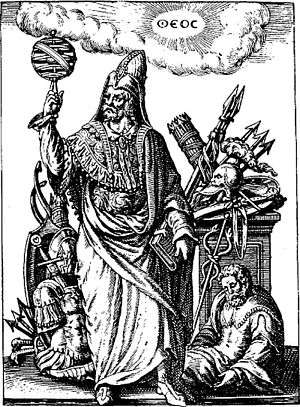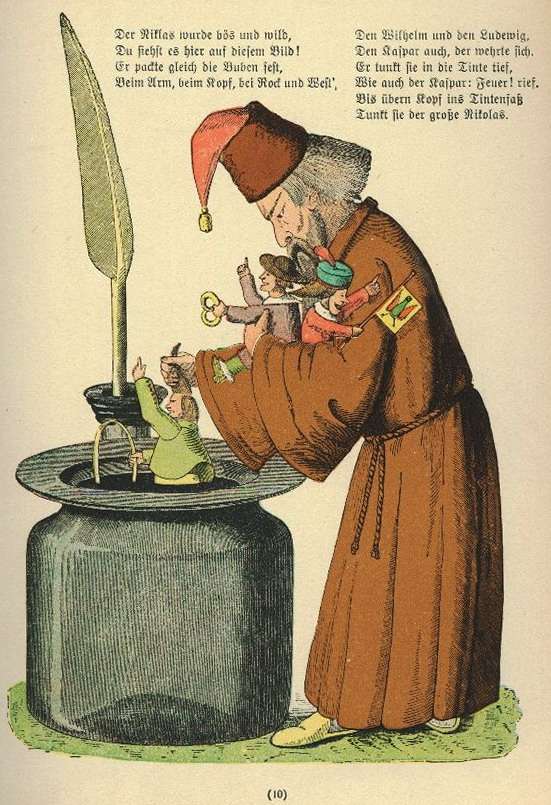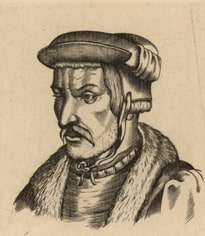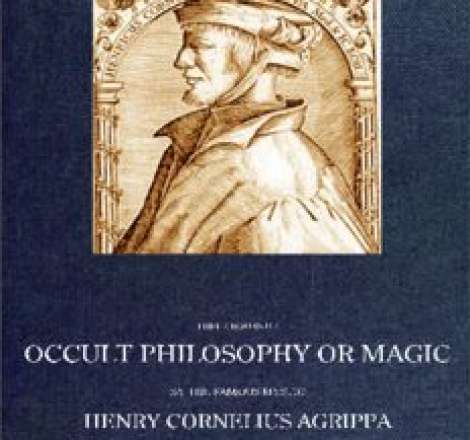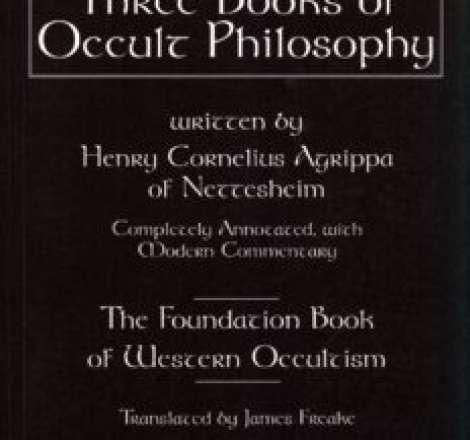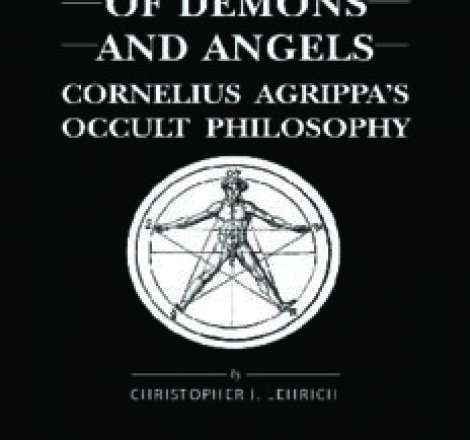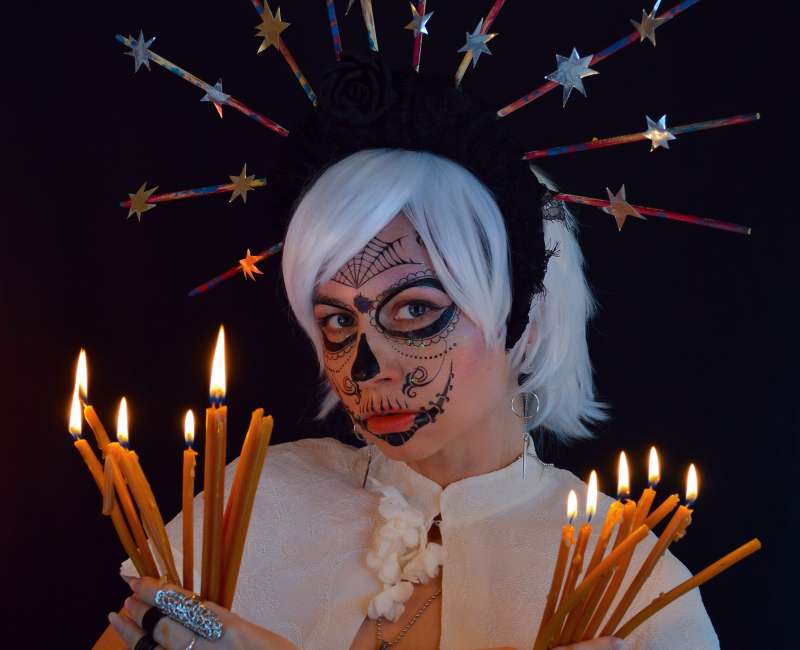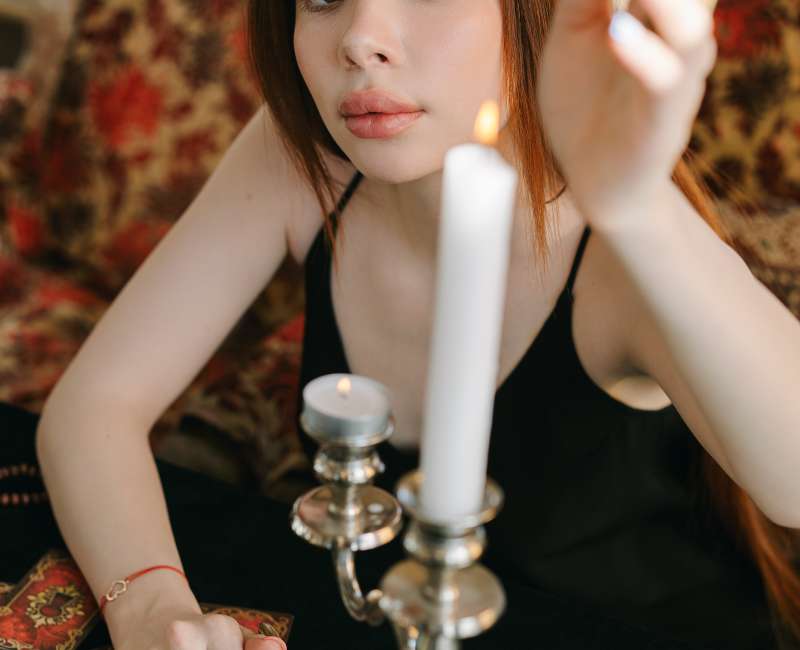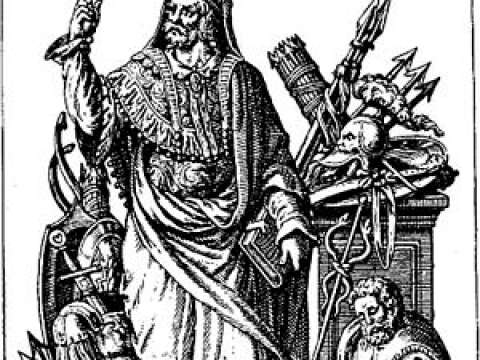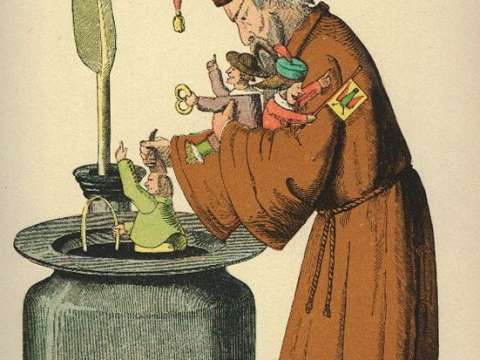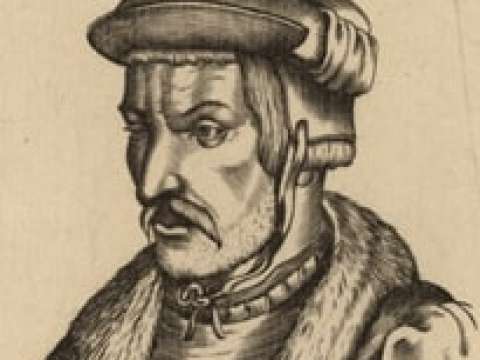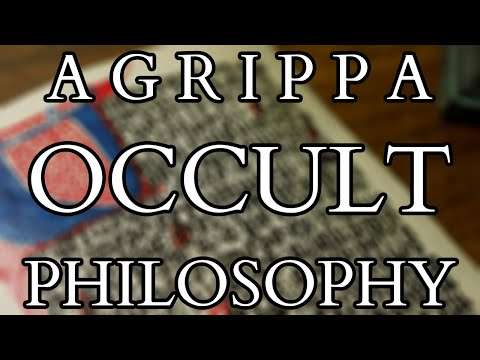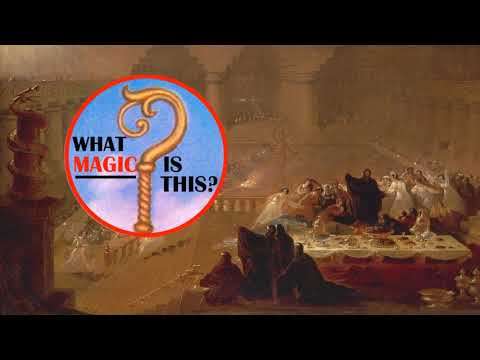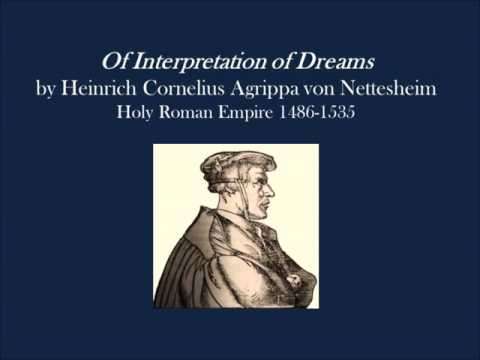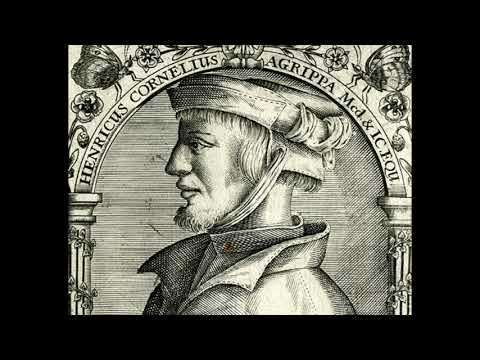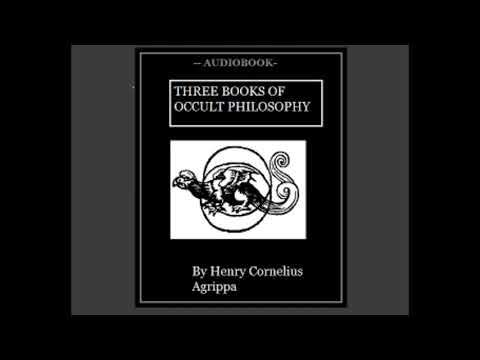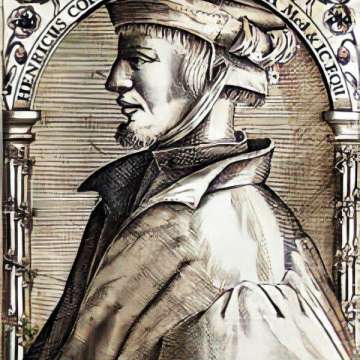

Heinrich Cornelius Agrippa (1486-1535)
Nothing is concealed from the wise and sensible, while the unbelieving and unworthy cannot learn the secrets.
Heinrich Cornelius Agrippa von Nettesheim was a German polymath, physician, legal scholar, soldier, theologian, and occult writer. He is considered one of the most influential occultists of the early modern period. His book on the occult Three Books of Occult Philosophy was published in 1533, but was condemned as heretical by the inquisitor of Cologne. His work drew heavily upon the influences of Kabbalah, Hermeticism and neo-Platonism.
Life
Agrippa was born in Nettesheim, near Cologne on 14 September 1486 to a family of middle nobility. Many members of his family had been in the service of the House of Habsburg. Agrippa studied at the University of Cologne from 1499 to 1502, age 13-16 when he received the degree of magister artium. The University of Cologne was one of the centers of Thomism, and the faculty of arts was split between the dominant Thomists and the Albertists. It is likely that Agrippa's interest in the occult came from this Albertist influence. Agrippa himself named Albert’s Speculum as one of his first occult study texts. He later studied in Paris, where he apparently took part in a secret society involved in the occult.
In 1508 Agrippa traveled to Spain to work as a mercenary. He continued his travels by way of Valencia, the Baleares, Sardinia, Naples, Avignon, and Lyon. He served as a captain in the army of Maximilian I, Holy Roman Emperor, who awarded him the title of Ritter or knight.
Agrippa's academic career began in 1509, receiving the patronage Margaret of Austria, governor of Franche-Comté, and Antoine de Vergy, archbishop of Besançon and chancellor of the University of Dole. He was given the opportunity to lecture a course at the University on Hebrew scholar Johann Reuchlin's De verbo mirifico. At Dôle, Agrippa wrote De nobilitate et praecellentia foeminae sexus On the Nobility and Excellence of the Feminine Sex, a work that aimed at proving the superiority of women using cabalistic ideas. The book was probably intended to impress Margaret. Agrippa’s lectures received attention, and he was given a doctorate in theology because of them. He was, however, denounced by the Franciscan prior Jean Catilinet as a "Judaizing heretic", and was forced to leave Dôle in 1510.
In the winter of 1509-1510 Agrippa returned to Germany and studied with Humanist Johannes Trithemius at Würzburg. On 8 April 1510 he dedicated the then unpublished first draft of De occulta philosophia On the Occult Philosophy to Trithemius, who recommended that Agrippa keep his occult studies secret. Proceeding to the Netherlands he took service again with Maximilian. In 1510 the king sent Agrippa on a diplomatic mission to England, where he was the guest of the Humanist and Platonist John Colet, dean of St Paul's Cathedral, and where he replied to the accusations brought against him by Catilinet Expostulatio super Expositione sua in librum De verbo mirifico. In the reply he argued that his Christian faith was not incompatible with his appreciation for Jewish thought, writing "I am a Christian, but I do not dislike Jewish Rabbis". Agrippa then returned to Cologne and gave disputations at the university's faculty of theology.
Agrippa followed Maximilian to Italy in 1511, and as a theologian attended the schismatic council of Pisa 1512, which was called by some cardinals in opposition to a council called by Pope Julius II. He remained in Italy for seven years, partly in the service of William IX, Marquess of Montferrat, and partly in that of Charles III, Duke of Savoy, probably occupied in teaching theology and practicing medicine. During his time in northern Italy Agrippa came into contact with Agostino Ricci and perhaps Paolo Ricci, and studied the works of philosophers Marsilio Ficino and Giovanni Pico della Mirandola, and the kabbalah. In 1515 he lectured at the University of Pavia on the Pimander of Hermes Trismegistus, but these lectures were abruptly terminated owing to the victories of Francis I, King of France.
In 1518 the efforts of one or other of his patrons secured for Agrippa the position of town advocate and orator, or syndic, at Metz. Here, as at Dôle, his opinions soon brought him into collision with the monks, and his defense of a woman accused of witchcraft involved him in a dispute with the inquisitor, Nicholas Savin. The consequence of this was that in 1520 he resigned his office and returned to Cologne, where he stayed about two years. He then practiced for a short time as a physician at Geneva and Freiburg, but in 1524 went to Lyons on being appointed physician to Louise of Savoy, mother of Francis I. In 1528 he gave up this position, and about this time was invited to take part in the dispute over the legality of the divorce of Catherine of Aragon by Henry VIII; but he preferred an offer made by Margaret, duchess of Savoy and regent of the Netherlands, and became archivist and historiographer to the emperor Charles V.
Margaret's death in 1530 weakened his position, and the publication of some of his writings about the same time aroused anew the hatred of his enemies; but after suffering a short imprisonment for debt at Brussels he lived at Cologne and Bonn, under the protection of Hermann of Wied, archbishop of Cologne. By publishing his works he brought himself into antagonism with the Inquisition, which sought to stop the printing of De occulta philosophia. He then went to France, where he was arrested by order of Francis I for some disparaging words about the queen-mother; but he was soon released, and on 18 February 1535 died at Grenoble. He was married three times and had a large family.

During his wandering life in Germany, France, and Italy, Agrippa worked as a theologian, physician, legal expert, and soldier. Agrippa was for some time in the service of Maximilian I, probably as a soldier in Italy, but devoted his time mainly to the study of the occult sciences and to problematic theological legal questions, which exposed him to various persecutions through life, usually in the mode described above: He would be privately denounced for one sort of heresy or another. He would only reply with venom considerably later Nauert demonstrates this pattern effectively.
No evidence exists that Agrippa was seriously accused, much less persecuted, for his interest in or practice of magical or occult arts during his lifetime, although it was known he argued against the persecution of witches. It is impossible, of course, to cite negatively, but Nauert, the best bio-bibliographical study to date, shows no indication of such persecution, and Van der Poel's careful examination of the various attacks suggest that they were founded on quite other theological grounds.
According to some scholarship: "As early as 1525 and again as late as 1533 two years before his death Agrippa clearly and unequivocally rejected magic in its totality, from its sources in imagined antiquity to contemporary practice." Some aspects remain unclear, but some believe this renunciation was sincere not out of fear, as a parody, or otherwise. Recent scholarship see Further Reading below, in Lehrich, Nauert, and Van der Poel generally agrees that this rejection or repudiation of magic is not what it seems: Agrippa never rejected magic in its totality, but he did retract his early manuscript of the Occult Philosophy – to be replaced by the later form.
In the Third Book of Occult Philosophy, Agrippa concludes with:
But of magic I wrote whilst I was very young three large books, which I called Of Occult Philosophy, in which what was then through the curiosity of my youth erroneous, I now being more advised, am willing to have retracted, by this recantation; I formerly spent much time and costs in these vanities. At last I grew so wise as to be able to dissuade others from this destruction. For whosoever do not in the truth, nor in the power of God, but in the deceits of devils, according to the operation of wicked spirits presume to divine and prophesy, and practising through magical vanities, exorcisms, incantions and other demoniacal works and deceits of idolatry, boasting of delusions, and phantasms, presently ceasing, brag that they can do miracles, I say all these shall with Jannes, and Jambres, and Simon Magus, be destinated to the torments of eternal fire.
According to his student Johann Weyer, in the 1563 book De praestigiis daemonum, Agrippa died in Grenoble, in 1535. Augustin Calmet wrote that Agrippa had a dog that jumped into the Rhone as his master neared death causing many to believe it was a demon.
Works
Agrippa is perhaps best known for his books. An incomplete list:
- De incertitudine et vanitate scientiarum atque artium declamatio invectiva Declamation Attacking the Uncertainty and Vanity of the Sciences and the Arts, 1526; printed in Cologne 1527, a skeptical satire of the sad state of science. This book, a significant production of the revival of Pyrrhonic skepticism in its fideist mode, was to have a significant impact on such thinkers and writers as Montaigne, Descartes and Goethe.[citation needed]
- Declamatio de nobilitate et praecellentia foeminei sexus Declamation on the Nobility and Preeminence of the Female Sex, 1529, a book pronouncing the theological and moral superiority of women. Edition with English translation, London 1670
- De occulta philosophia libri tres Three Books Concerning Occult Philosophy, Book 1 printed Paris 1531; Books 2-3 in Cologne 1533. This summa of occult and magical thought, Agrippa's most important work in a number of respects, sought a solution to the skepticism proposed in De vanitate. In short, Agrippa argued for a synthetic vision of magic whereby the natural world combined with the celestial and the divine through Neoplatonic participation, such that ordinarily licit natural magic was in fact validated by a kind of demonic magic sourced ultimately from God. By this means Agrippa proposed a magic that could resolve all epistemological problems raised by skepticism in a total validation of Christian faith.
The book was a major influence on such later magical thinkers as Giordano Bruno and John Dee, after the decline of the Occult Renaissance concomitant with the scientific revolution. The book whose early draft, quite different from the final form, circulated in manuscript long before it was published is often cited in discussions of Albrecht Dürer's famous engraving Melencolia I 1514. Note that Philosophy of Natural Magic: Complete Work on Natural Magic, White & Black Magic, 1569, ISBN 1-56459-160-3, is simply book 1 of De occulta philosophia libri tres.

A spurious Fourth book of occult philosophy, sometimes called Of Magical Ceremonies, has also been attributed to him; this book first appeared in Marburg in 1559 and is not believed to have been written by Agrippa.
A semi-complete collection of his writings were also printed in Lyon in 1550; arguably more complete editions followed, but none is without serious textual problems.
- Recently Sylvain Matton attributed, with caution, to Agrippa an anonymous De Arte Chimica first printed in 1572 by Pietro Perna in the Auriferæ artis, quam chemiam vocant, antiquissimi authores.
Modern editions of Agrippa's works
- De occulta philosophia libri tres. Ed. Vittoria Perrone Compagni. Leiden and Boston: Brill, 1992: ISBN 90-04-09421-0.
- The Philosophy of Natural Magic, Translated by James Freake, Edited by L. W. de Laurence 1913. Only book one
- The Philosophy of Natural Magic, Translated by James Freake, Edited by Leslie Shepherd 1974. University Books. ISBN 0-82160-218-7, Only book one; reprint of the Laurence edition
- Three Books of Occult Philosophy, Translated by James Freake, Annotated by Donald Tyson 2005. Llewelyn Worldwide. ISBN 0-87542-832-0
- Three Books of Occult Philosophy Book One: A Modern Translation, Translated by Eric Purdue 2012. Renaissance Astrology Press. ISBN 1-10589-879-2
- Declamation on the Nobility and Preeminence of the Female Sex. Translated by Albert Rabil, Jr. Chicago: University of Chicago Press, 1996: ISBN 0-226-01059-7
- Female Preeminence: An Ingenius Discourse. Translated by H.C., Edited by Tarl Warwick 2016. ISBN 1-53532-532-1
- Of the Vanitie and Vncertaintie of Artes and Sciences. Edited by Catherine M. Dunn. Northridge, CA: California State University Foundation, 1974. ASIN: B0006CM0SW
- De Arte Chimica attributable to Henry Cornelius Agrippa; a critical edition of the Latin text with a seventeenth-century English translation by Sylvain Matton, Paris: SÉHA; Milan: Archè, 2014
- De Occvlta Philosophia — Four Books. Translated and edited by Paul Summers Young, 2020. Black Letter Press, Germany
In popular culture
In Christopher Marlowe's late 16th century play The Tragical History of Doctor Faustus, where Faustus decides to study necromancy and proclaims he will become "as cunning as Agrippa was" Act 1, Scene 1, Line 119.
In Mary Shelley's 1818 novel Frankenstein; or, The Modern Prometheus, his writings, along with those of Albertus Magnus and Paracelsus, are listed as influences on a young Victor Frankenstein.
Appears as a character in Mary Shelley's 1833 short story The Mortal Immortal.
Appears in Søren Kierkegaard's 1845 book Stages on Life's Way.
In most English translations of Struwwelpeter 1847, "Great Agrippa" replaces Saint Nicholas as the sage in "The Story of the Inky Boys", chastising three white children for tormenting a black youth because of the colour of his skin. When they ignore his advice, Agrippa dips all three in his giant inkwell, until they are blacker than the boy they were teasing.

Agrippa is a character in Valery Bryusov's 1908 novel The Fiery Angel and the opera by Sergei Prokofiev based on the novel.
In Zork Nemesis, a 1996 game with alchemy as its main theme, one of the primary instances is called "Temple of Agrippa".
The 1997 novel Harry Potter and the Philosopher's Stone mentions a collectible card of Agrippa.
Alongside his student Johann Weyer, Agrippa appears as a character in the 2010 video game Amnesia: The Dark Descent.
Both of the video games Harry Potter and the Philosopher's Stone and Harry Potter and the Chamber of Secrets feature a collectible card of Cornelius Agrippa with his real birth and death years his card is bronze in the second game.
Appears as the Wizard character that mentors the protagonist Max August in Steve Englehart's The Point Man 1981, with a reference to his pet dog that dies in the Rhone River.
In Alan Moore's Jerusalem, Alma Warren is preoccupied with matters of the occult. She studies Agrippa as well as other occult heavyweights. .
Heinrich Cornelius Agrippa is a character in High School DxD, being one of the real life historical figures who were reincarnated into devils, serving the Gremory Devil Noble Family.
Gordan Agrippa, of the House Agrippa, from Black Clover. His Family is notorious for its curse magic. His family shares the same surname.
Agrippa is mentioned in the lyrics of Born to Night, a Primordial song featured on the Where Greater Men Have Fallen album.
Heinrich Cornelius Agrippa is a character in the light novel The Magic in this Other World is Too Far Behind!, he is the master and founder of the society.

